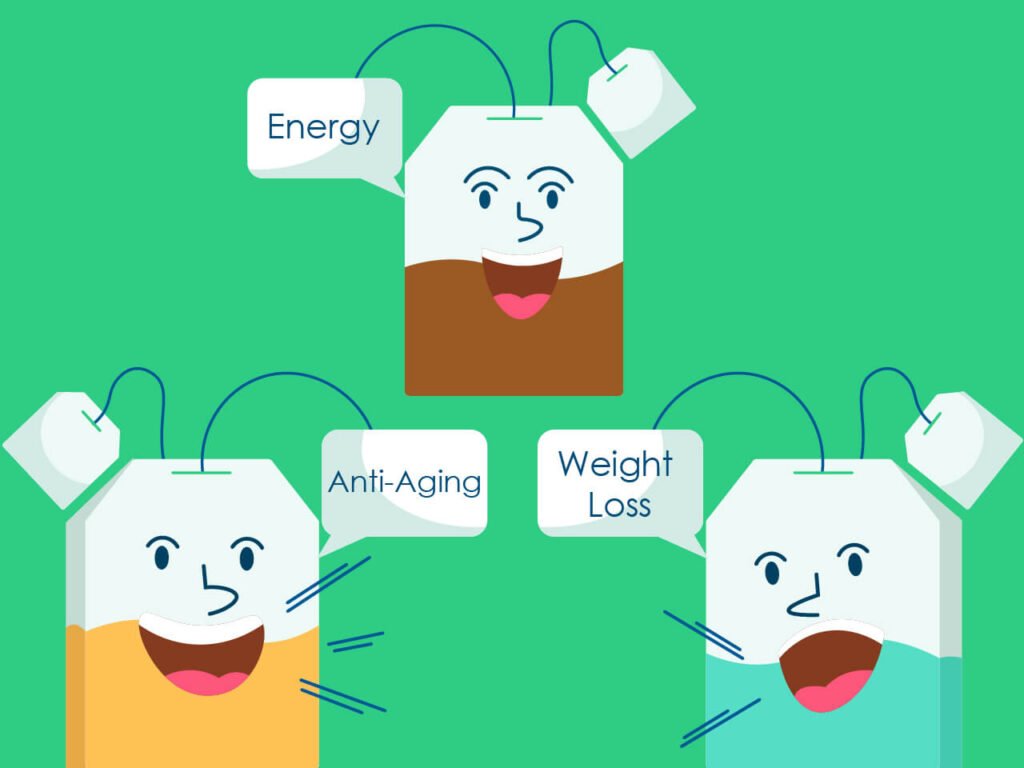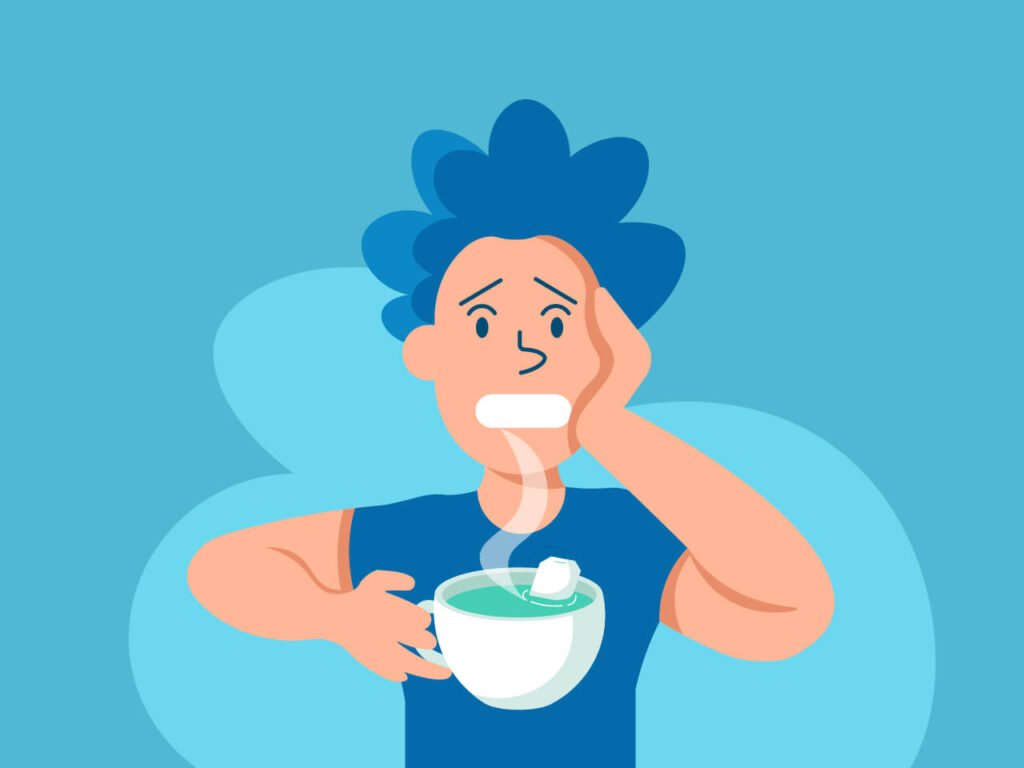
Unlike coffee, high caffeine tea consumption causes an energy boost without getting a sharp crash a few hours later.
In addition, tea contains the amino acid l-theanine, which reduces stress and anxiety and improves your mood without any sedative effects.[1][2][3]
Personally, I usually have no need for caffeine.
Yet, after a night of lack of sleep, I decided to get the best high caffeine tea I could find.
I was confused during my purchase when I looked at all the tea types in the supermarket.

Which type has the amount of caffeine I need? Which type is the best to make me feel more focused? Are there any or different side effects?
In order to be ready for my next tea purchase, I read every research I could find about the most popular types of tea.
Based on all the data I collected, I wrote this definitive guide to choose the best high caffeine tea to support your health goals.
So, this is how you select the best high caffeine tea for you:
Contents
Step 1: Decide What the Required Caffeine Content Is
Drinking a high caffeine tea will make you feel more energetic and focused.
However, it does not mean that the more caffeine the better.
In case you only consume caffeine occasionally, you should go for a tea type with moderate caffeine content.
Jumping right away to high caffeine content might cause you stress and anxiety.

On the other hand, if you consume caffeine regularly, you should aim for a tea type with high caffeine content in order to feel energized.
Important. Pregnant women should avoid caffeine because:
- For every increase in caffeine intake of 100 mg a day, the risk of low birth weight might raise by 13%.[4]
- For every increase in caffeine intake of 150 mg a day, the risk of pregnancy loss can raise by 19%.[5][6]
- In a study, maternal caffeine intake was associated with shorter birth length, smaller head circumference, and a shorter gestational age.[7]
Tea Types with Moderate Caffeine Content
In case you need moderate caffeine content, you should go for:
- Green tea – 31 mg of caffeine per cup on average.
- White tea – 27 mg of caffeine per cup on average.
- Oolong tea – 31 mg of caffeine per cup on average.
Tea Types with High Caffeine Content
In case you need high caffeine content, you should go for:
- Matcha tea – up to 130 mg of caffeine per cup.
- Yerba mate – 59 mg of caffeine per cup on average.
- Black tea – 49 mg of caffeine per cup on average.
- You can go for a tea with a lower caffeine content but you will need to double the amount you consume.
Now that you know which types of tea contain the amount of caffeine you need, let’s see which one of those is the best high caffeine tea to achieve your health goals…
Step 2: Go for the Best High Caffeine Tea to Support Your Health Goals
Tea support many health goals.
However, different types of tea might support different health goals more than the others.
So here are the health goals the tea support with all the supportive evidence I could find.
Pick the ones that are most important to you.
The benefits of drinking tea are:
Weight Loss
A result of a study pointed out that consuming two cups of extra high-catechin green tea every day for 90 days would lead to a decrease in waist circumference by 1.9cm[8]
Green tea might increase the fat oxidation rate by 17%.[9]

Green and white tea, may increase energy expenditure by 5%.[10]
Yerba mate consumption in an hour before exercising can increase fatty acid oxidation by 24%,[11][12] and it might also lower body weight gain and obesity in general.[13]
Drinking 5 big cups (300 mL/cup) of Oolong tea increases fat oxidation by 12%.[14]
Also, Oolong tea can increase energy expenditure by 10%.[15]
In a study, participants consumed 8g of oolong tea every day for 60 weeks. 64% of the participants have lost at least 1 kg and 22% of the severely obese subjects lost at least 3 kg.[16]
Drinking 5 big cups (300 mL/cup) of Oolong tea increases fat oxidation by 12% Share on XFighting Bad Breath
The polyphenols in green tea help to fight bad breath better than chewing gum.[17]
Lower Risk of Stroke
3 cups of green tea a day can lower the risk of stroke by 21%.[18]
Black tea consumption may reduce the risk of stroke by up to 20%.[19]
Less Risk of Cancer
2 cups of Green tea consumption a day is associated with an 18% decreased risk of developing lung cancer.[20][21]
In addition, regular consumption of green tea may reduce colorectal cancer risk in women.[22]
Also, a large cohort study showed a markable decrease in the risk of advanced prostate cancer in those with habitual consumption of green tea.[23]
Each cup of Oolong tea may reduce the risk of head or neck cancer by 4%.[24]
White tea might act as an antineoplastic agent for lung cancer.[25]
Stronger Heart
Drinking Oolong tea daily may reduce the risk of mortality from cardiovascular disease by 61%.[26]
Black tea consumption may reduce the risk of coronary heart disease by up to 20%.[19]
Healthy Brain
Consuming 2 cups of green tea daily can reduce the risk of developing Alzheimer’s disease by 64%.[27]
Matcha tea consumption of 2 grams a day may be effective in improving cognitive function or reducing the progression of cognitive dysfunction.[28]
Regular Oolong tea consumption is associated with lower risks of cognitive impairment and decline,[29] and with improved cognitive performance.[30]
Balancing Blood Sugar
Having 3 cups of black tea every day for 12 weeks can lower serum glucose levels by 18%.[31]
Having 4 cups of black tea a day might play a role in the prevention of type 2 diabetes.[32]
Matcha tea can suppress blood glucose accumulation.[33]
Yerba mate has a beneficial effect on insulin resistance.[34][35]
White tea extract can reduce most of the diabetes-associated abnormalities.[36]
Lower Blood Pressure
Green tea is rich in antioxidants, like catechins and polyphenols, which help to lower blood pressure.[37]
Consuming 2 – 3 cups of green tea daily can reduce the risk of developing hypertension by 64%.[38]
Protection of The Liver
Matcha tea helps to protect the liver.[39][40][41]
More Good Cholesterol, Less Bad Cholesterol
5 cups of black tea every day for 3 weeks can reduce bad cholesterol (LDL) by 11%.[42]
In addition, having 3 cups of black tea daily for 12 weeks can decrease the LDL/HDL ratio by 17%.[31]
Drinking 3 big cups (330 mL a cup) of Yerba Mate daily for 40 days reduces bad cholesterol up to 13%.[43]
Green tea consumption lowers LDL cholesterol in adults.[44]
Gut Health
The polyphenols in black tea promote growth for beneficial gut bacteria.[45]
Anti-Aging
Matcha tea has the highest antioxidant potential among all tea types.[46]
Black tea consumption has the ability to inhibit free radical generation.[47]
Yerba mate has a high antioxidant capacity.[48]
Stress Management
The aroma of black tea diminishes stress levels significantly.[49]
Oral Health
Black tea can help to fight periodontal disease.[50]
Anti-Inflammatory
Yerba mate has an anti-inflammatory effect.[51]
Alleviate Parkinson
Parkinsonian mice that drank yerba mate had a hyper locomotor behavior in relation to the control group.[52]
Fresh Skin
Daily consumption of oolong tea can be an effective treatment for recalcitrant atopic dermatitis, in addition to the dermatological treatment.[53]
Step 3: Consider the Side Effects
At this point, you know which type of tea contains the required amount of caffeine for you and support the health goals that are the most important to you.
Now let’s make sure you are aware of its side effects.
Here are some of the risks and side effects of consuming high caffeine tea:
General Side Effects of High Caffeine Tea
Since all types of tea I mentioned in this post contain caffeine, they include the risk of consuming too much caffeine.
For healthy adults, the upper limit is 400 mg of caffeine per day.[54]
If you go for Matcha tea, for example, you can drink no more than 3 cups a day.
If you prefer white tea, you can drink even 10 cups a day.
Among the side effects of caffeine overdose are:[55]
- Worsen Bipolar disorder
- Irregular heartbeat
- Aggravate diabetes
- Diarrhea
- Epilepsy
- Worsen schizophrenia
As I have mentioned before, it is recommended for pregnant women to avoid caffeine consumption.
In addition, some types of tea might interfere with medicines. Consult your doctor if you are on any medications.
You should also take into account that the polyphenols in tea inhibit iron absorption from plant-based foods.[56]
Therefore, you should NOT consume it with a meal or 1 hour before/after a meal.
Side Effects of Green Tea:
- The vitamin K in green tea inhibits the effect of warfarin (an oral anticoagulant).[57]
- Reduction in folic acid levels.[58]
- Might increase the risk of preterm birth.[59]
- Thyroid function can be impaired by green tea extracts at high doses.[60]
- Excessive consumption might cause hypokalemia – a low level of potassium in the blood serum, which leads to feeling fatigued.[61]
Side Effects of Matcha Tea:
- Might cause an upset stomach.
- Can interfere with iron absorption.[62]
Side Effects of Black Tea:
- Increased blood estrogen levels were found in black tea drinkers.[63]
- Black tea can reduce folic acid levels.
- Might make anemia worse.[64]
- Perceived to cause constipation.[65]
- Black tea might contain manganese in excessive levels, which might be toxic.[66]
Side Effects of Yerba Mate:
- Regular consumption of Yerba Mate in large amounts (more than 1 liter daily) might increase the risk of cancer of the esophagus, larynx oral, and oropharyngeal.[67][68][69][70][71]
- Mate contains monoamine oxidase inhibitor (MAOI) which is used in antidepressants and Parkinson’s medications. Consult your doctor in case you use antidepressants or Parkinson’s medications before consuming mate.
Side Effects of Oolong Tea:
- Consuming 2 cups a day might increase the risk of developing diabetes.[72]
- Do not consume oolong tea if you use stimulants (amphetamines, ephedrine, etc.) or blood-thinning medications.[73]
- In a study, drinking hot oolong tea increased ESCC (esophageal squamous cell carcinoma) risk in the high-risk group.[74]
In Conclusion
Tea consumption is considered safe in moderate doses among the majority of the population.
However, it is still important to be aware of potential risks so that you can make educated decisions about whether or not you should consume a certain tea type.
Now let’s see what is the taste of each tea type and how you can make them taste even better…
Step 4: Go for Your Desirable Flavor
Each type of tea has its own unique flavor.
Among the tea types that contains the amount of caffeine you need and support your health goals, go for the one with the flavor you like the most.
The best way to know if you like a tea is, of course, to taste it.
But before that, it is good to have some clue about what type of flavor each tea has and how you can make the most of its flavor.
The Color of Your Mug Matters
It is proven that our eyes taste our foods and drinks before we even consume them.
So here is how you can make the best out of it:
If you like your tea sweet, avoid consuming the tea in a white mug.
Researchers found that tea in white mugs tastes less sweet than tea in transparent or blue mugs.[75]
According to Dr. Stuart Farrimond, a tea expert, drinking the tea from a red or purple mug will make it taste sweatier.[76]
Researchers found that tea in white mugs tastes less sweet than tea in transparent or blue mugs Share on XHow Does Green Tea Taste Like?
The taste of green tea ranges from sweet to bittersweet (depends on the type).
Other common descriptions of the taste of green tea are vegetal and oceanic.
However, steeping the green tea for too long will make its taste very bitter.
How to Make Green Tea Taste Better:
- In order to counter the bitter taste, infuse lemon slices with boiled water and add the green tea a minute or two after.
- Loose leaf tea tends to be less bitter than green tea made from tea bags because it contains less dust and low-quality tea particles.
- If it is summer, you can brew the tea with cold – lukewarm water in a teapot, and put it in the fridge for a few hours before drinking it.
How Does Matcha Tea Taste Like?
Matcha tea is made from the same plant as green tea but it is more powerful than green tea because of the way it’s prepared.
Matcha has a sweet earthy taste. There might be also a little bit of bitterness.
How to Make Matcha Tea Taste Better:
- Make sure you use high-quality matcha.
- Brewing with boiled water will make the matcha bitter. Let the water cool for a few minutes before brewing.
- Cold brewing might make it taste a little sweet and creamy.
For all of you who like that sweet-creamy taste, this is how you cold brew matcha:
How Does Black Tea Taste Like?
The flavor of black tea is very rich and bold. It can range from sour to sweet (depends on the type of black tea).
Since it has a strong flavor, it is the best tea for those who love the strong flavor of the coffee.
How to Make Black Tea Tastes Better:
- Use natural sweeteners. Add berries, slices, or a juice of citrus (lemon, orange, lime, or grapefruit) or a little bit of honey.
- Avoid over-steeping so it won’t taste too bitter.
- Add cinnamon to enrich the flavor.
Take a look at these 3 black tea recipes:
How Does Yerba Mate Taste Like?
The taste of Yerba Mate is very strong and slightly bitter.
It might also have a woodsy taste (depends on the number of stems).
How to Make Yerba Mate Taste Better:
- Prefer loose leaves over tea bags.
- Don’t feel the gourd/cup more than 3/4 of its capacity.
- Before brewing, wet the leafs\tea bag with a little bit of cold water.
- If you don’t like the bitter taste of traditional mate, add a little bit of citrus juice (lemon, orange, lime, or grapefruit) or a little bit of honey.
- Brew with water at the temperature of 150 – 170 degrees Fahrenheit (65 – 75 degrees Celsius).
- Drink it using bombilla in order to avoid small chunks of leaves reaching your mouth.
- If it’s a hot summer, go for a cold mate (terere). Here’s how to make it:
How Does Oolong Tea Taste Like?
The taste of Oolong depends on how it was produced. It can be sweet, fruity, or even woody.
Oolong is in the second place (after black tea) in terms of strong flavor.
How to Make Oolong tea Taste Better:
- Use 2 grams of tea leaves per cup.
- You can add vanilla extract, honey, and/or cinnamon. Avoid adding sugar.
- Use distilled or spring water boiled to 200 degrees Fahrenheit (95 degrees Celsius).
- Don’t let it brew for more than 5 minutes to avoid a bitter taste.
- Some people say that brewing the leaves for the second time produces a richer taste than the first brew.
How Does White Tea Taste Like?
The taste of white tea is light, fruity, and moderately sweet.
How to Make White Tea Taste Better:
- White tea expires sooner than other types of tea. Make sure the leaves you purchase are fresh and consume them within a few months.
- Buy it in small chunks so you always consume it fresh.
- Store in a dark place away from heat and moisture.
- Use 4 grams of tea leaves per cup (about 2 full teaspoons) in order to get a rich flavor.
- Brew with water at 160 – 185 degrees Fahrenheit (70 – 85 degrees Celsius) to avoid a bitter taste.
- Let it brew for at least 5 minutes.
- It is best to drink the white tea plain, without any addition of sweeteners, milk, spices, etc.
Final Words…
Selecting the best type of tea for you shouldn’t be a complicated mission.
However, selecting your tea type by only considering the caffeine content will make you miss many benefits that other types of tea can offer you.
Therefore, I recommend you to follow each step of this definitive guide to select the best high caffeine tea for you.
This way, you will be able to match the right type of tea for you in terms of caffeine content, taste, and health conditions.
p.s.
Would you like your friends and followers to know how to choose the best high caffeine tea for them and to help this blog grow at the same time?